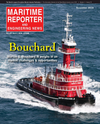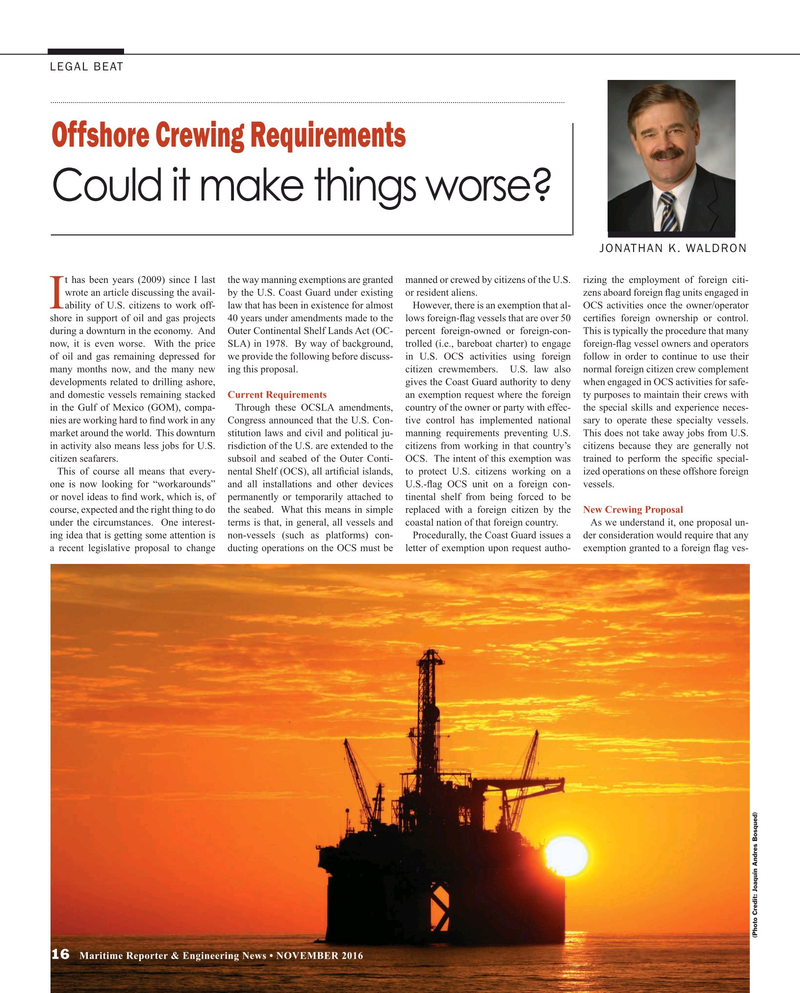
Page 16: of Maritime Reporter Magazine (November 2016)
Workboat Edition
Read this page in Pdf, Flash or Html5 edition of November 2016 Maritime Reporter Magazine
LEGAL BEAT
Offshore Crewing Requirements
Could it make things worse?
JONATHAN K. WALDRON t has been years (2009) since I last the way manning exemptions are granted manned or crewed by citizens of the U.S. rizing the employment of foreign citi- wrote an article discussing the avail- by the U.S. Coast Guard under existing or resident aliens. zens aboard foreign ? ag units engaged in ability of U.S. citizens to work off- law that has been in existence for almost However, there is an exemption that al- OCS activities once the owner/operator
I shore in support of oil and gas projects 40 years under amendments made to the lows foreign-? ag vessels that are over 50 certi? es foreign ownership or control. during a downturn in the economy. And Outer Continental Shelf Lands Act (OC- percent foreign-owned or foreign-con- This is typically the procedure that many now, it is even worse. With the price SLA) in 1978. By way of background, trolled (i.e., bareboat charter) to engage foreign-? ag vessel owners and operators of oil and gas remaining depressed for we provide the following before discuss- in U.S. OCS activities using foreign follow in order to continue to use their many months now, and the many new ing this proposal. citizen crewmembers. U.S. law also normal foreign citizen crew complement developments related to drilling ashore, gives the Coast Guard authority to deny when engaged in OCS activities for safe- and domestic vessels remaining stacked Current Requirements an exemption request where the foreign ty purposes to maintain their crews with in the Gulf of Mexico (GOM), compa- Through these OCSLA amendments, country of the owner or party with effec- the special skills and experience neces- nies are working hard to ? nd work in any Congress announced that the U.S. Con- tive control has implemented national sary to operate these specialty vessels. market around the world. This downturn stitution laws and civil and political ju- manning requirements preventing U.S. This does not take away jobs from U.S. in activity also means less jobs for U.S. risdiction of the U.S. are extended to the citizens from working in that country’s citizens because they are generally not citizen seafarers. subsoil and seabed of the Outer Conti- OCS. The intent of this exemption was trained to perform the speci? c special-
This of course all means that every- nental Shelf (OCS), all arti? cial islands, to protect U.S. citizens working on a ized operations on these offshore foreign one is now looking for “workarounds” and all installations and other devices U.S.-? ag OCS unit on a foreign con- vessels. or novel ideas to ? nd work, which is, of permanently or temporarily attached to tinental shelf from being forced to be course, expected and the right thing to do the seabed. What this means in simple replaced with a foreign citizen by the New Crewing Proposal under the circumstances. One interest- terms is that, in general, all vessels and coastal nation of that foreign country. As we understand it, one proposal un- ing idea that is getting some attention is non-vessels (such as platforms) con- Procedurally, the Coast Guard issues a der consideration would require that any a recent legislative proposal to change ducting operations on the OCS must be letter of exemption upon request autho- exemption granted to a foreign ? ag ves- (Photo Credit: Joaquin Andres Bosqued) 16 Maritime Reporter & Engineering News • NOVEMBER 2016
MR #11 (10-17).indd 16 11/4/2016 2:11:40 PM

 15
15

 17
17
